Australia is a very large country, some will tell you there's a whole lot of nothing in between a few good-sized cities and in a way that can be true. It's certainly remote in places but then a whole lot of the best stuff is out there in that remoteness. That's why you need to know a few essential tips for safely driving in outback Australia before heading out.
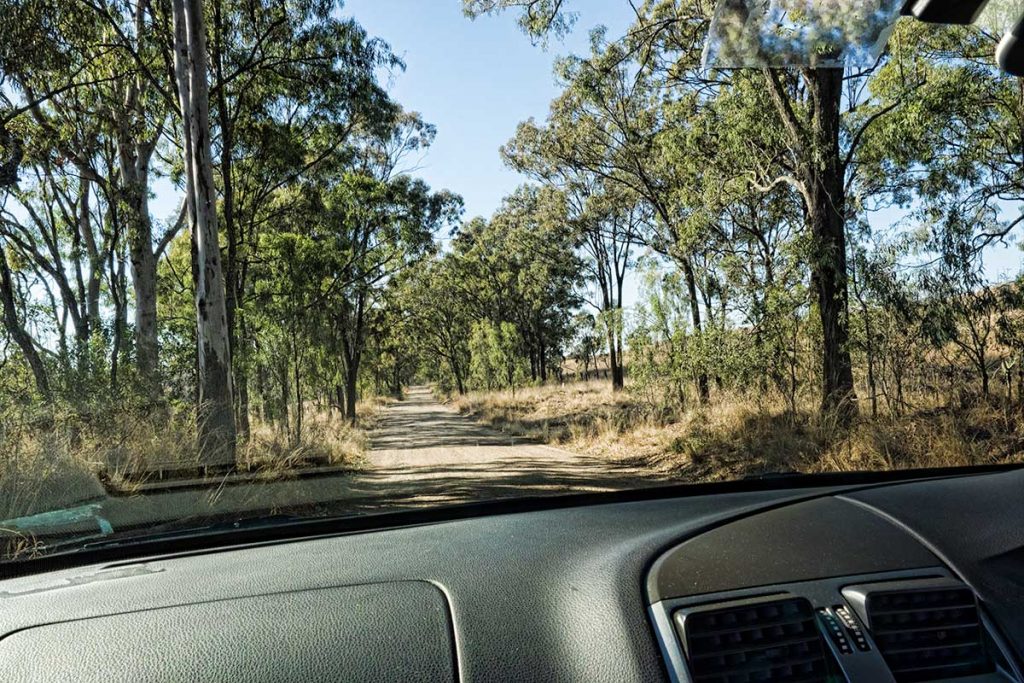
One of the best ways to really see Australia is the good old fashioned road trip. Whether you have a day on the weekend to head out and explore or a year of freedom to see the country, a road trip is almost always the best choice.
Driving in Australia has some unique challenges. Once off that main coastal band, and even some parts along it, there are going to be very few people. Your challenge isn't the other drivers out there, it's being self-sufficient if you do run into problems.
There are places you may drive 300 km between petrol stations, not the 3km most of us are used to on our daily commute. There are certainly some roads where no other vehicles are likely to come by for a few hours or even a few days.
10 tips to drive Australia safely in outback & remote areas
1. Maintain your vehicle
Make sure your vehicle is up to the challenge. Some will tell you an off-road vehicle is essential for driving anywhere in Australia but it does depend on where you're going. A substantial part can be navigated in a standard car if you're staying on the main highways, taking selective side trips and travelling in the dry season.
Whatever you choose to drive it's worth making sure its servicing is up to date and the tyres are good. A pre-departure tyre pressure, water and oil level check is always good practice.
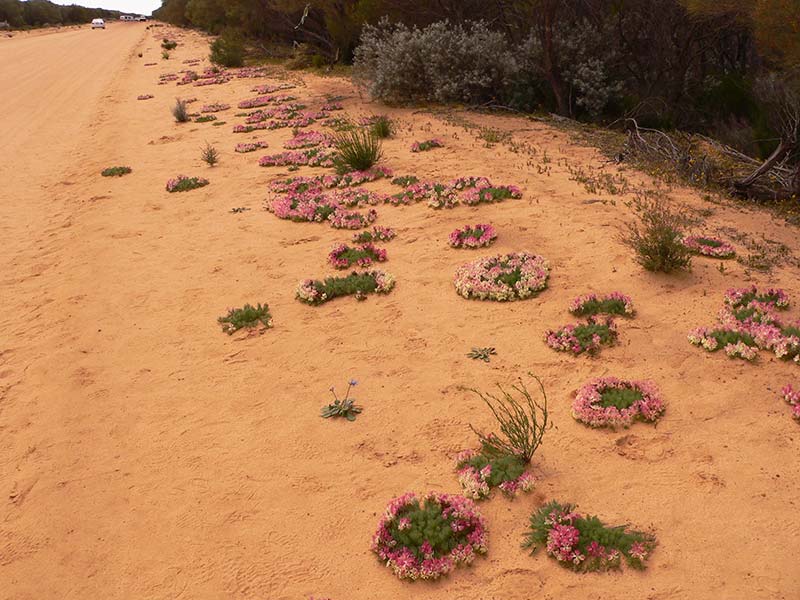
2. Fuel up when you can
It can be a long way between fuel stops so gas up when you have the chance. It's true that fuel is a bit more expensive outside of the main centres but don't drive on past looking for a cheaper one. You're going to feel a lot less stupid having paid a few extra cents a litre than having running out of fuel 40km past the fuel station with no idea how far away the next one is.
3. Food and water
Carry a good supply of fresh drinking water in the vehicle and enough food in case you hit delays or breakdown along the way.
4. Natural hazard
Extreme weather conditions in Australia mean that flooding, bush fires and cyclones can occur with minimal warning. If a road is closed it's for a good reason, don't drive past the warning signs. Stay aware of weather reports and check for road closures.
Extreme weather is also hard on the road surfaces, roads may be unsealed or only partially sealed, deep potholes may form, they are likely to be slippery in the wet and dusty to a degree that obscures visibility in the dry. Adjust your speed to the conditions and use your headlights in poor visibility, it won't help you see much better but does give an early warning to oncoming traffic.
Many outback roads are flat, straight and run directly east / west. That means they can be particularly dangerous with sun strike at dawn and dusk. Avoid driving during those periods when you can and if you don't have a choice then slow down. Australia is well known for its wildlife and many of these animals are also more active at these times and can appear suddenly in the middle of the road.
5. First aid kit and medications
A well-stocked first aid kit is a must for in the vehicle and we usually also have a mini kit that lives in the daypack that comes with us hiking. Once out in the bush or on the back roads, you need to be self-sufficient so don't just carry the kit, know the basics for using it. We have a detailed post on what to include in your first aid kit and a review of our survival first aid kit linked here.

6. Emergency kit
You should also have a basic emergency kit for your vehicle. While most of us don't understand what happens under the hood of a modern vehicle with all the computerised bits now there are still some basics that are worth carrying.
- At least one spare wheel that's been checked and is in good condition
- A jack, brace, spanners and screwdrivers
- A tow rope and jump leads
- A fire extinguisher
- Tarpaulin
- Torch, batteries, lighter or matches
7. Leave details of your travel plans
Make sure you have someone who knows where you are heading and when you expect to arrive. If you're travelling through really remote areas have a contact plan with someone who can raise the alarm if you don't check in within the agreed margin and has some idea the route you were taking. Somewhere in Western Australia is NOT helpful information for rescue services.
8. Stop, revive, survive
Be aware of the signs of fatigue while driving. Take a short break or swap drivers every two hours on the road. Some of the warning signs to watch out for are:
- Yawning
- Slower reactions than usual
- Over steering or swerving
- Dry and sore eyes
- Lack of concentration
- Daydreaming
Stretching your legs and a cup of coffee will work to some degree for most people but not for everyone. They aren't a substitute for sleep. Remember to plan for a proper break on a longer drive especially if you're travelling alone.
9. In case of a breakdown
If you suffer an accident or breakdown in a remote area try to get your vehicle safely clear of the road without obscuring it from passing traffic. If you have an emergency reflector put it out so it's clear you're in need of assistance. It's common sense but stay out of the sun, conserve energy and resources.
In townships your mobile phone may work, in between quite possibly, it won't. Unless you've just passed a town or homestead the universal advice is to stay with your vehicle. Even if you believe no one is going to miss you for a day or two you have protection from the elements and more water and equipment than you could carry. Someone is more likely to pass by the road than if you're taking a shortcut through a field and it's much easier for a search team to locate. Sadly people have died not following this advice.
10. If you're unsure, ask
Aussies in general are friendly and helpful. Take a few minutes to chat with people when you pass through towns or at rest stops along the way. If you're unsure of the road conditions ahead, just ask.
Even an hour or two inland from the coast can have you in an area where the RACQ (or equivalent) aren't going to be able to send someone to help you with that flat tyre or the keys you locked in the car. The sole police officer may have to come from 3 towns over in the event of an accident.
People that live in that environment, or pass through it regularly, rely on each other to help out. We've been fortunate so far not to have needed help but have appreciated how quick locals are to pull off and check on you if something doesn't look right. It's also a reminder to pay it forward, be aware of your own safety but if you can offer assistance to someone in need then please do.
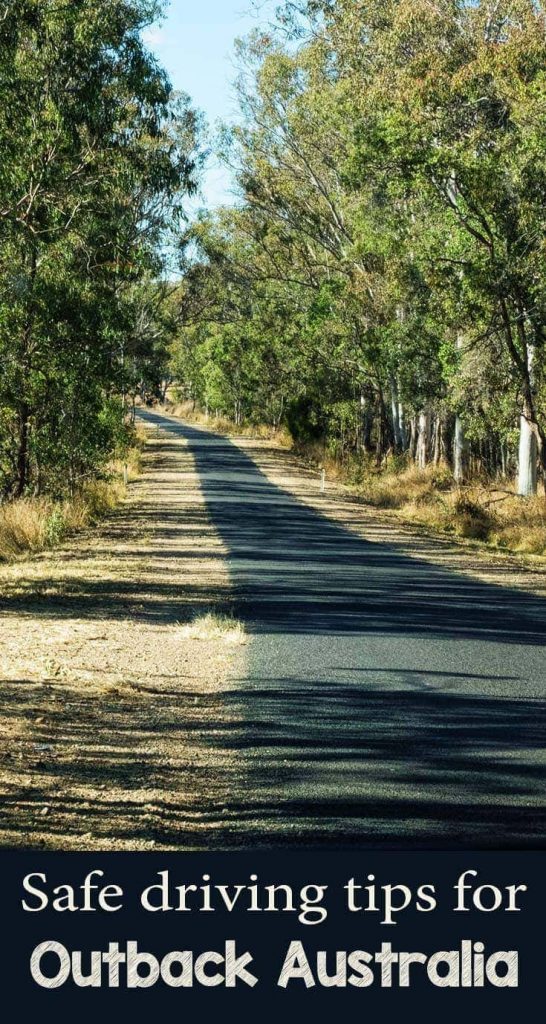
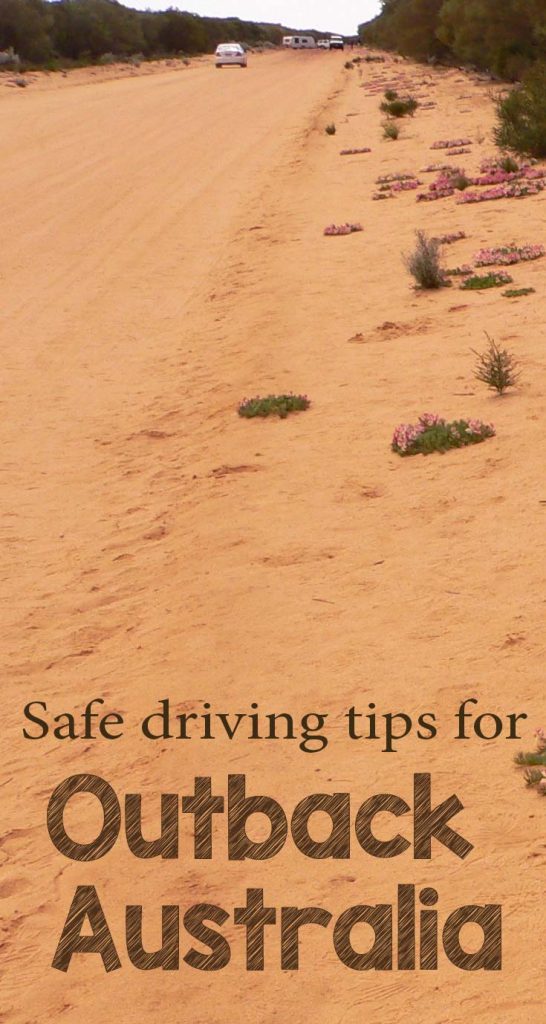
Are you a fan of the open road? If you have any extra tips to drive Australia safely please leave them in the comments below. We'd also love you to share your best road trip so far or what ones you're looking forward to heading off on?

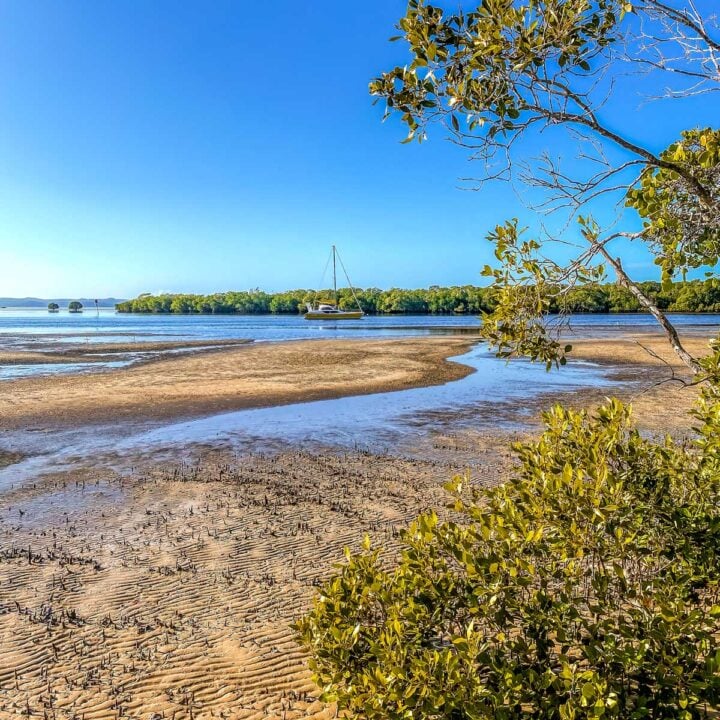
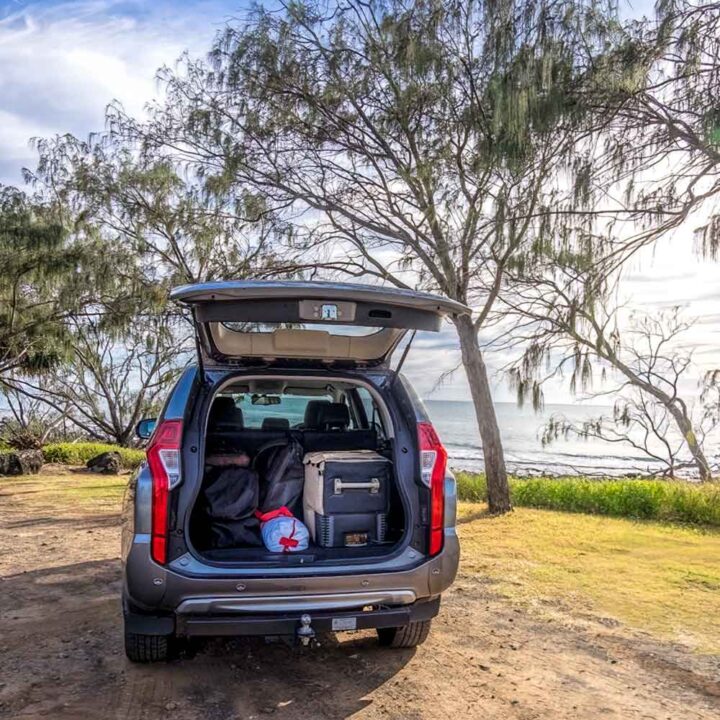
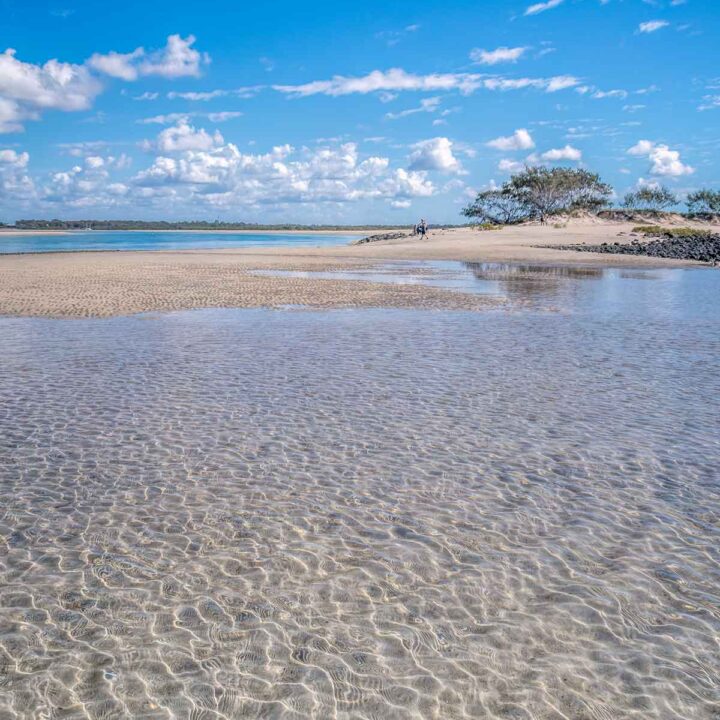
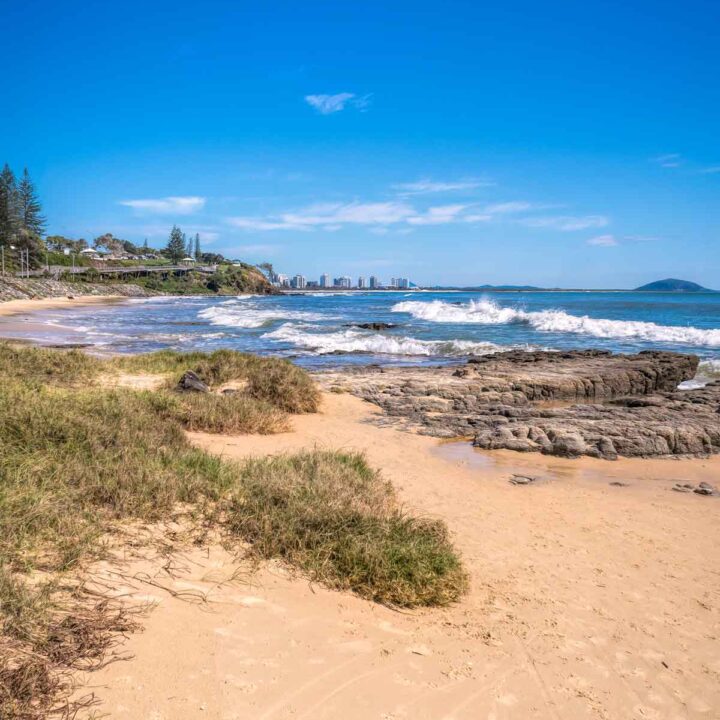
susan says
Also, you must have 2 spare tyres
James Thomas says
First aid is the must as you will not any qualified doctor in the outback, so be prepared and get to know your tracks before going off-road.
Trisha Velarmino - P.S. I'm On My Way says
Thanks for the tips! I don't have plans in traveling AU yet but this will come handy one day! Btw, I am loving the look of your blog: clean and simple. Plus your font is awesome!
2 Aussie Travellers says
Thanks Trisha. If you ever do get down this way and have any questions let me know.
Jen Joslin says
A road trip across the Australian outback would be an incredible adventure! Hoping my husband and I can make it happen someday. 300km between petrol stations is quite a long distance. It sounds very necessary to be prepared for a road trip there, and these are all great tips!
mark wyld says
The distances in Australia can be a challenge for people not used of it.
Natalie says
These are some great tips! I've always wanted to drive through the heartland of Australia but have wondered how easy it would be to do so. Based on your article, it definitely seems like it's manageable if you prepare in advance. Hopefully I will get to use your tips in the future 🙂
Corinne says
This is a great post. As road-trippers we have driven on some remote roads and it did have some challenges. One thing I wasn't prepared for were the cattle trains. They scared the you-know-what out of me! And, I think looking back on it, we probably didn't have enough water with us or a first aid kit. Ignorance, thankfully, didn't harm us...that time! Again, great post!
2 Aussie Travellers says
Yes very true, the size of the trucks and the speed they travel is something that takes some getting used to!
Hugo Cura says
Big fan of road trips! I've done quite a few and these tips are spot on. Very useful in general but especially for any road trip where the distance between towns is considerable.
Thank you for sharing!
Julie says
Just this morning I was talking about how an Aussie road trip is high on my list of travel dreams. I think taking off for a couple months would be magical - maybe it's all the YouTube videos of baby kangaroos I've seen that have me wanting more! I made a special note of your recommendation to get petrol anytime you have a chance - it makes total sense but as I live in a place where petrol is easy to come by, I never even thought of it!
Amelie says
Sound advices! I just wished I knew how to drive, hahaha! 😉
Meg Jerrard says
Such good tips Toni, it's so important to travel prepared when you're driving through the Outback because it can be really harsh if you get into trouble and your unprepared. We were driving a trailer and rocks kicked up while on the road and smashed our back windscreen. Luckily that was the worst thing that happened to us on the road, but anything can happen out there. It was such a rewarding trip and loved every minute of it - such beautiful landscapes out there. But just really need to be well prepared 🙂
Vicki says
Great tips! Australia is such a vast country that I'm bound to do some outback driving at some point (give me time - i've only been here 3 years!) so I've pinned this for future reference! Thanks for sharing your wisdom 🙂
Kerri McConnel says
My brother is about to head off on a 16,500km trip through outback Australia. I'm sure he has all these tips on board plus a whole heap more 🙂 We live in such an incredible country.
2 Aussie Travellers says
That sounds like a great trip Kerri, we sure do live in a fabulous country.